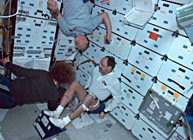Muscles and space missions
With the recent success of Mars Rover mission Spirit, and the anticipated landing of Opportunity later this month, a manned mission to Mars is now the talk of the planet. Last week the White House announced plans to establish an American colony on the moon and launch a manned mission to Mars by 2030. According to new McGill research, stress caused to the human body by the weightlessness encountered during space missions will need to be addressed for a successful Mars initiative.

The ISS crew performing the H-reflex experiment
According to new study by Douglas Watt, director of McGill's Aerospace Medical Research Unit, weightlessness can reduce astronaut muscle control. Watt likens the condition to a reversible and temporary version of Lou Gehrig's Disease — a neurodegenerative disease that that attacks nerve cells and pathways in the brain and spinal cord, ultimately causing paralysis. The research — the first medical experiment to be conducted on the International Space Station — examined astronaut spinal cord excitability during and after a prolonged space mission. Spinal cord excitability is a key component of our brains' ability to control muscle contractions.
The experiment involved the application of a tiny electric shock behind the knee of each astronaut, in order to replicate the less accurate but more familiar tendon reflex test where a doctor taps the knee of a patient with a rubber hammer. The test is known as a Hoffman or H-Reflex. "The size of the resulting involuntary knee-jerk reaction, reflects the number of motor neurons used and hence the level of spinal cord excitability," explained Watt.
"On Earth, the H-reflex response is generally the same every time," continued Watt. "The situation changes when the test is administered in space." The astronauts experienced a decrease in spinal cord excitability of approximately 30 percent — a condition that remained for months on end. "Astronauts quite literally cannot generate the same amount of strength in their muscles," said Watt. "The mind of the astronaut may remain sharp and alert, it's their muscle control — particularly the legs — that is affected."
The documented decrease in spinal cord excitability could compromise the ability of an astronaut to react quickly and effectively in an emergency situation. "Although the condition itself does not deteriorate much over time, the time it takes astronauts to recover does" explained Watt. A typical space mission is two weeks in duration; the astronauts involved in the present study spent between 3.5 and 5 months in space. A mission to Mars may require astronauts to endure abnormal gravity for a period of years.
According to Watt, is unclear how to best deal with the rigors of space travel on the human body. One option might involve the creation of an artificial Earth gravity within a Mars-bound spaceship, but this would be particularly expensive. "An alternative solution might entail the design of a completely new exercise regime for astronauts," suggested Watt; it is an area of research that he plans to continue in the coming years.
These results reveal how physically challenging a mission to the red planet might be on the astronauts involved. In addition to all the technical issues and the astronomical cost involved — estimated in billions of dollars according to some sources — the physical impact on the astronauts may well be one of the more complex problems to solve. "Space is an alien environment to us," explained Watt. "Gravity is the most stable factor in our lives and when it is suddenly removed, our body finds it difficult to cope."
